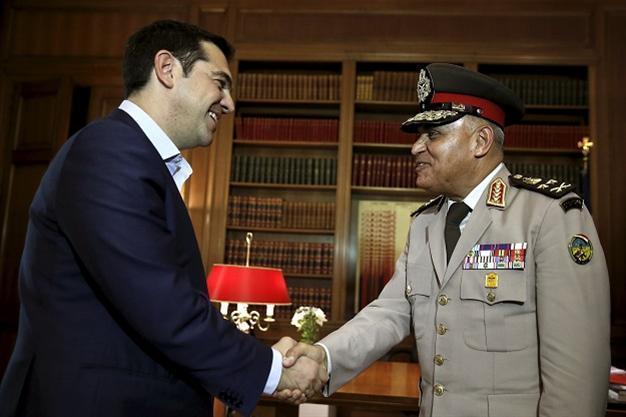Greek PM Tsipras ready to compromise in exchange for debt relief
ATHENS/BRUSSELS - Reuters

Greek Prime Minister Alexis Tsipras (L) welcomes Egyptian Defense Minister General Sedki Sobhi at his office in Athens, June 12, 2015. REUTERS/Alkis Konstantinidis
Greek Prime Minister Alexis Tsipras said he was willing to accept unpalatable compromises to secure a deal with international creditors, provided he gets debt relief in return, something that Germany refuses to countenance.
With Greece heading towards possible default and bankruptcy, he told his negotiating team before it took a counter-proposal to Brussels that without debt relief he would say "no" to any settlement with the EU and IMF that isolate his country from the rest of Europe.
In little more than a fortnight, Athens must repay 1.6 billion euros to the International Monetary Fund with money it does not have.
Greek ministers arrived in Brussels on Saturday to resume negotiations with international creditors on a cash-for-reforms deal that ended in stalemate on Thursday.
The counter-proposal offering concessions on budget issues is designed to break the deadlock that is threatening Greece's future in the euro zone.
Tsipras, who was elected in January on promises to end austerity, made it clear he was willing to give ground but with strings attached that German Chancellor Angela Merkel is highly unlikely to accept.
"If we have a sustainable solution, regardless of how difficult the compromise is, we will bear the burden because the only criteria are exiting the crisis and the bailouts," a government official quoted Tsipras as telling the ministers on Friday night before they headed to Brussels.
Tsipras used the term "sustainable solution" to refer to a long-standing demand for large parts of Greece's mountainous debts to be written off - something he believes is vital if the Greek economy is to start getting back on its feet after a five-year depression.
Much of that debt is owed to Germany, the biggest contributor to Greece's 240 billion euro bailouts. Any acceptance by Merkel that the money might never be paid back would almost certainly create uproar among the country's politicians and taxpayers.
Tsipras also signaled that without debt relief, he would reject any deal which isolated his country from the rest of Europe, such as the creditors' demands for curbs on the right of Greek workers to bargain collectively on pay - something that union members elsewhere take for granted.
"If Europe desires the split and the continuation of subjugation, we will make the big decision to say 'no' and fight the battle for the dignity of the people and our national sovereignty," he said.
PSYCHOLOGICAL PRESSUREGovernment spokesman Gabriel Sakellaridis gave more details on the negotiating stand, such as on the primary surplus, a budget balance that excludes debt repayments, and the creditors' demands for yet more of the austerity that has already radically reduced Greeks' living standards.
"The government seeks a solution which will include a debt relief, low primary surpluses, no wage and pension cuts, an investment package and restarting the economy," he told Agora newspaper.
"Debt relief is not an ideological obsession or a symbolic move, but a necessary condition to relieve people and jumpstart the economy," he added.
On Friday, EU officials said representatives of euro zone member states had formally discussed a series of scenarios, including for the first time one which involved a possible Greek default on the repayment to the International Monetary Fund due by the end of this month.
Athens, which attended a meeting of the official-level Euro Working Group on Thursday, has denied that any such scenario had come up.
Defaulting on a repayment to the IMF, the lender of last resort under the post-World War Two global financial system, would have profound consequences. The European Central Bank would probably have to halt emergency lending that supports Greek banks, which have suffered huge withdrawals by anxious savers.
Athens would then probably have to respond with capital controls, curbing deposit withdrawals and payments abroad in a series of events that would put Greece's future in the euro in grave danger.
But Sakellaridis dismissed such a scenario. "The Greek banking system is steady and solvent, which is being proven every day. Any other theories are just part of the negotiation, a form of (mainly psychological) pressure."
Finance Minister Yanis Varoufakis, a former academic economist, played down any possibility of Greece being forced out of the euro.
"As a former statistician, I will never consent to the notion that there is a zero probability event," he told BBC radio. "It is also possible that a comet will hit planet Earth ... (but) I don’t believe that any sensible European bureaucrat or politician will go down that road.”
Varoufakis, who has been sidelined from the negotiations since falling out with some of his euro zone colleagues, said he believed Merkel would not "even begin to contemplate an exit of Greece from the euro zone".
Asked if the EU and IMF were bluffing, he said: "I hope they are."
